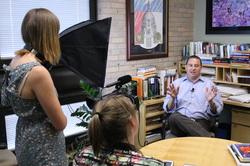
The Science of Food Waste
Olivia Ash
May 29, 2014
AUSTIN, Texas - Just a few short hours after touching down in Austin, Texas, the team woke up early and hit the ground running.
We started off in the beautiful Austin City Hall, speaking with Bob Gedert, Director of Austin Resource Recovery.
The city of Austin has plans in place to aim for zero waste by 2040. Gedert passionately spoke with us about the plan, before rushing off to his day full of meetings.
“This is a positive answer,” he said. “We call it the journey to zero waste because we know we can’t get to zero waste quickly.”
Gedert believes that the change will come slowly, but is worthwhile nonetheless.
After a midday snooze (Did I mention that we each got four hours of sleep?), we got the scientific perspective on food waste via Dr. Michael Webber, Professor of mechanical engineering at University of Texas at Austin.
Webber worked on a study that quantified the amount of energy lost when food is wasted, which is laid out in his article “Wasted Food, Wasted Energy.”
“There is enough energy in the food we [Americans] waste to power a whole country,” said Webber.
This is because of all of the embedded energy in the food we eat. We as consumers must consider not just the actual food that we are wasting when we throw leftovers in the trash, but also the energy that went into producing and transporting that food, said Webber.
From agricultural production, to transportation, to processing, to cooking, waste can occur on many levels.
While both interviews today focused on very different angles to the issue, there was one major commonality. Both emphasized the importance of education as a way to change our wasteful ways.
“It’s hard to change the culture if people don’t even know what’s going on,” said Webber.
Education, then, is a crucial component to this “journey to zero waste” that many are hoping for.
The team has another day of interviews in Austin, before packing up and heading to Iowa. Stay tuned for more adventures to come!
Olivia Ash
May 29, 2014
AUSTIN, Texas - Just a few short hours after touching down in Austin, Texas, the team woke up early and hit the ground running.
We started off in the beautiful Austin City Hall, speaking with Bob Gedert, Director of Austin Resource Recovery.
The city of Austin has plans in place to aim for zero waste by 2040. Gedert passionately spoke with us about the plan, before rushing off to his day full of meetings.
“This is a positive answer,” he said. “We call it the journey to zero waste because we know we can’t get to zero waste quickly.”
Gedert believes that the change will come slowly, but is worthwhile nonetheless.
After a midday snooze (Did I mention that we each got four hours of sleep?), we got the scientific perspective on food waste via Dr. Michael Webber, Professor of mechanical engineering at University of Texas at Austin.
Webber worked on a study that quantified the amount of energy lost when food is wasted, which is laid out in his article “Wasted Food, Wasted Energy.”
“There is enough energy in the food we [Americans] waste to power a whole country,” said Webber.
This is because of all of the embedded energy in the food we eat. We as consumers must consider not just the actual food that we are wasting when we throw leftovers in the trash, but also the energy that went into producing and transporting that food, said Webber.
From agricultural production, to transportation, to processing, to cooking, waste can occur on many levels.
While both interviews today focused on very different angles to the issue, there was one major commonality. Both emphasized the importance of education as a way to change our wasteful ways.
“It’s hard to change the culture if people don’t even know what’s going on,” said Webber.
Education, then, is a crucial component to this “journey to zero waste” that many are hoping for.
The team has another day of interviews in Austin, before packing up and heading to Iowa. Stay tuned for more adventures to come!
